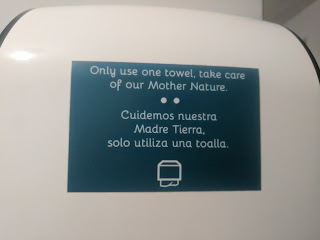Over Winter Break I visited Nicaragua for 11 days. Nicaragua is the poorest country in Central America, and the second poorest in the Western Hemisphere (after Haiti). Perhaps their extreme poverty has lead people to adapt more sustainable ways. My last stop was Leon, which is located North West of the capital Managua and is the second largest city. It has long been the intellectual and liberal political center of Nicaragua.
I stayed at the hostel, Casa Abierta. They are a budding Eco-hostel, offering Vegatarian meals, recycling projects and an overall awareness of greener practices. Their mission statement is: "We are committed to the environment, we recycle our waste and make crafts such as lamps or menu newspaper."
http://www.guialeonesa.com/perfil.php?l=1
South side of HEODRA Hospital.
(505) 2311-0313
 |
| We are an eco-hostel. We are a work in Progress. Recycling Zone. |
Throughout the hostel, they encourage guests to think about their actions and take steps to reduce their waste.
They have a garden where they grow some of their food. The offer a full organic and vegetarian menu, with many vegan options. Everything was delicious!
 |
Sign made with bottle caps Salad  |
 |
| Garden |
 |
| They reuse plastic bottles to act as barriers in the garden. |
They offer free filtered water, in order to discourage guests from buying more bottled water.
 |
| Filtered water. |
They have artistic signs about the environmental impact on straws.
 |
| Why should we stop using straws? |
 |
| 1 restaurant = 45,000 straws per year |
 |
| It takes 1000 years to decompose straws |
There is inspirational artwork throughout the hostel:
 |
| There is beauty in simplicity |
 |
| Unity in Diversity |
 |
| Love Joy Peace |
 |
| Look at things. . . Different |
 |
| We are looking for people who want to change the world |
 |
| Just Smile Think Green and Leave Footprint |
They encourage guests to buy local:
 |
| 6 reasons to consume local: Fight against monopolies and help construct a country that is more fair. Generate self-esteem and security for small businessmen. Promote an economy more equitable. Transform the reality economy of the country. Support families to thrive in an independent way. Promote social justice, solidarity, and take care of the environment. |
They reuse and recycle to make art:
 |
| I was there during Christmas time, and they made a Christmas tree out of books. They are available to swap, encouraging reuse. |
 |
| Wish for Change. Guest write wishes on pieces of paper and tie them to a tree. |
Leon was a truly magical place, and Casa Abierta was a wonderful Oasis.
 |
| Me with my tour guide in the Museum of Revolution. He has been fighting for the Sandinista's for decades! |




























































